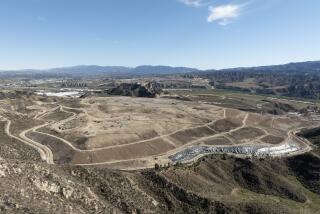Group Says County Let Dump Pollute
- Share via
VAL VERDE — A national environmental group was to release a report today alleging that for years, Los Angeles County has allowed the operators of Chiquita Canyon Landfill to pollute the air and ground water near this impoverished town while gradually expanding the dump without permission.
County officials have also ignored the dumping of liquid wastes and sewage that were expressly barred from the site, according to the report, which marks the first time a national group has joined the fight to shut down the landfill run by Laidlaw Waste Systems Inc.
The nine-page report, prepared by the Washington, D.C.-based Clean Water Action, comes as Laidlaw is trying to extend its operating permit another 15 years and triple the size of the landfill to 18.2 million tons of garbage. It says that Laidlaw has been cited by county regulators numerous times but never had a permit revoked or was ever fined.
For example, the report says, Laidlaw was cited for receiving sludge in 1991 by two different agencies, including the Los Angeles County Department of Health Services. Sludge is the material left after human waste is chemically treated.
“The record shows that there has been a decade of sweeping these violations under the rug,” Patricia Schifferle, a group spokeswoman, said last week. She added that before the county Board of Supervisors approves expanding the facility, a complete environmental impact report should be done.
A Laidlaw spokesman denied the allegations, saying the group is spreading misinformation in an effort to derail the planned expansion of the dump.
“We are in the process of a landfill expansion,” said Rodney Walter, Chiquita Canyon general manager. “This group is just trying to make the process as hard as possible on us. We addressed all of the concerns to the [Los Angeles County Regional Planning Commission] and they found nothing to be concerned about.”
The Planning Commission approved the expansion proposal in September. But the plan still needs final approval from the Board of Supervisors, which is expected to do so at a public hearing on Tuesday.
“This will be our final opportunity to present this evidence before this decision is made,” said Schifferle, who hinted that some of the groups opposing the landfill might take legal action. “We feel like the comments of Val Verde have been largely ignored.”
She and other activists have long argued that Val Verde, located about three miles northeast of Santa Clarita, has been forced to endure the landfill because its residents are mostly poor minorities. Created in the 1920s as an African American vacation resort, it now is inhabited by a large number of Latinos.
The report says the landfill has become a “visual blight” for neighbors because it has exceeded its height requirement, and that it could contaminate more ground water as it creeps closer to the Santa Clara River.
Walter, of Laidlaw, would not comment on specific allegations in the report but provided a copy of a June 1996 letter written by his attorneys to the California Regional Water Quality Control Board in response to a complaint by a Val Verde resident.
In the letter, the company said that the allegations were untrue, that Laidlaw had complied with its permits and was not the renegade operation opponents of the landfill have made it out to be.
Richard Hanson, the county’s chief of solid waste management, acknowledged that Laidlaw has been cited but said that the company has always responded quickly to correct the problems.
He said the dump was found to have a leak about two years ago.
“There was a minor problem with gas migration at a one spot,” Hanson said. “An order was issued to correct the problem and they filled it. These are incredibly sophisticated facilities and they create gas just as all dumps do.”
Hanson also said he is offended by the the group’s allegations that regulators have turned their backs on Chiquita Canyon. He echoed Walter’s claim that critics are only interested in blocking the dump.
“We are all trained inspectors,” Hanson said. “Many of the federal regulations that exist come from California. We would be the last to look the other way.”
More to Read
Sign up for Essential California
The most important California stories and recommendations in your inbox every morning.
You may occasionally receive promotional content from the Los Angeles Times.










